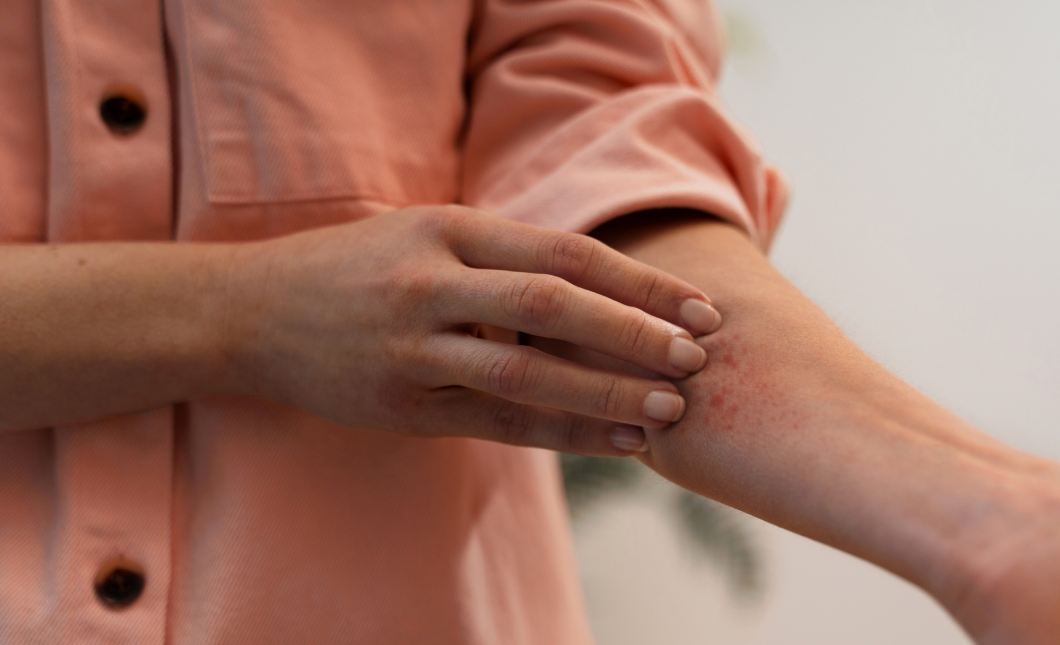When the Skin Speaks in Rashes: A Homeopathic View on Urticaria
Aarti, a 34-year-old school teacher, was no stranger to skin allergies. But over the past few weeks, her episodes became more distressing. Red, raised patches would appear suddenly on her arms and legs, accompanied by intense itching and a burning sensation that left her irritable and exhausted. The wheals came without warning—after meals, during her morning walk, or sometimes for no obvious reason at all. Antihistamines gave temporary relief, but the hives always came back. When one such episode ended in swelling around her lips and eyes, she was told it was urticaria and was advised long-term medications. Instead, she chose to explore homeopathy—and experienced a gradual but lasting transformation.
Urticaria, also commonly referred to as hives or nettle rash, is a skin reaction that manifests as red, raised, itchy welts or wheals on the surface of the skin. These lesions can appear suddenly and vanish just as quickly—only to reappear at a different location. The welts may be pale or red and can vary in size and shape. Some are small and isolated; others coalesce to form larger plaques. Urticaria may also be accompanied by burning, stinging pain, or swelling beneath the skin known as angioedema, especially around the eyes, lips, and genitals.
The underlying mechanism in urticaria is an exaggerated immune response, usually involving the release of histamine from mast cells in response to an allergen or trigger. This reaction causes dilation of blood vessels and leakage of fluid under the skin—resulting in wheal formation. While allergic reactions to food, drugs, insect bites, or environmental allergens are common causes, in more than half the cases, the exact trigger remains elusive. Triggers range from emotional stress, heat, cold, water contact, pressure, exercise, and even scratching of the skin (dermatographic urticaria).
Diagnosis is usually clinical—based on history and the appearance of skin lesions. In cases where the trigger is unclear or hives are recurrent, allergy testing or blood tests may be considered to evaluate underlying causes such as autoimmune disorders or thyroid dysfunction.
A Homeopathic Perspective on Urticaria
Homeopathy offers a comprehensive and gentle approach to managing urticaria—especially for those seeking long-term relief without the side effects of conventional medication. In acute cases, homeopathic remedies can help calm an ongoing episode by reducing the welts and controlling symptoms like itching, burning, and stinging. But the real strength of homeopathy lies in its ability to address the root causes of urticaria.
By focusing on the individual’s constitution and immune response, homeopathy works to correct the internal imbalance that causes the hypersensitivity. It helps regulate the overproduction of histamine and strengthens the immune system’s tolerance threshold. Over time, this reduces the frequency, duration, and intensity of hives episodes and prevents recurrences.
Importantly, homeopathic treatment also reduces dependency on antihistamines, steroids, and other suppressive drugs that provide only symptomatic relief. Since remedies are derived from natural sources and work with the body’s innate healing mechanism, they are safe and non-toxic—even for long-term use.Homoeopathic medicines have no sedation like antihistamines. However, homeopathy is best suited for mild to moderate cases. In severe reactions or life-threatening episodes of anaphylaxis, urgent conventional intervention is necessary.
Each person’s experience of urticaria is unique, and so is their treatment. A remedy that works wonders for one individual may not suit another. The selection of the right homeopathic medicine requires careful evaluation of the patient’s symptoms, triggers, emotional state, and general health. Some of the commonly used remedies include:
- Apis Mellifica– For red, inflamed wheals with intense burning and stinging pain, worse from heat or touch, better from cold applications.
- Natrum Mur– Ideal when hives are triggered by heat or exercise, accompanied by stinging and smarting.
- Urtica Urens– Suited for seasonal hives with a recurring pattern, especially linked to diet (like shellfish) or cold exposure.
- Rhus Tox– For hives that arise after water exposure with intense itching and burning after scratching.
- Dulcamara– When hives are triggered by cold, damp weather, especially in children.
- Astacus Fluviatilis– Particularly helpful in chronic hives with liver-related disturbances.
- Sulphur– For recurrent urticaria with itching worse from warmth, often linked with dry, burning skin.
- Chloralum– For dermatographic urticaria—where scratching leads to raised welts—and where hives appear mostly at night.
Homeopathy provides individualized treatment tailored to each patient, aiming not just to suppress the symptoms but to build resilience from within. With time and consistent care, almost all patients experience complete relief, improved immunity, and better overall well-being.


